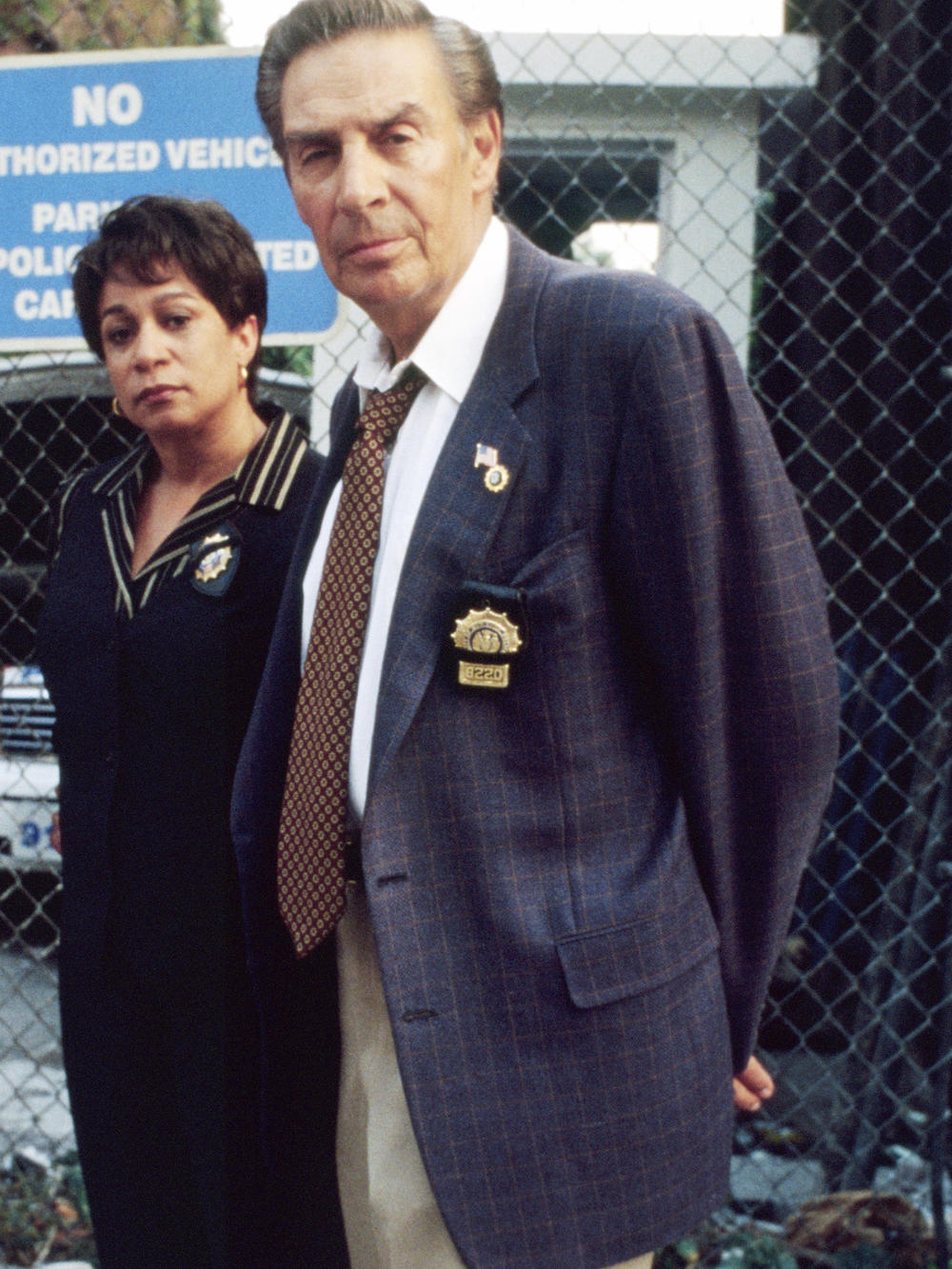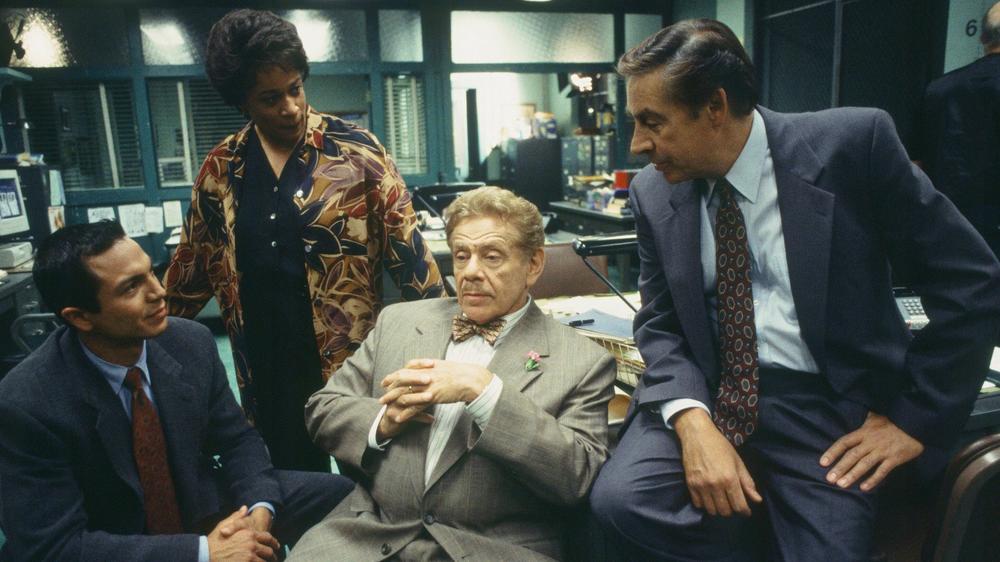Section Branding
Header Content
Dun dun — done! Why watching 'Law & Order' clips on YouTube is oddly satisfying
Primary Content
Everybody loves a good cops-and-robbers story. But I really love vintage Law & Order episodes.
The appeal is complicated. I stumbled on the show when it debuted in 1990, feeling like a TV cop show version of the Al Pacino legal drama And Justice for All — focused on a gritty, trashy vision of New York with an all-male core cast and ripped-from-the-headlines stories where rich people literally got away with murder. The unique format — usually, about half the episode focuses on cops finding a suspect, the other half on prosecutors trying the case — felt revolutionary at the time.
But it wasn't until years later, when Broadway veteran Jerry Orbach joined the cast as Detective Lennie Briscoe and reruns papered the A&E cable channel at all hours, that my addiction for Law & Order really bloomed — aided by a visit in 1998 to the show's set, where I met Orbach himself, a charming embodiment of New Yawk attitude so beloved that one crew member told me that vendors would hand him free hot dogs on location.
Hooked on bite-size bits of TV drama
So, imagine my delight when I discovered that the official Law & Order YouTube channel has edited excerpts of episodes starting at Season 20 and reaching back to the series' debut (the channel also has clips of episodes from Law & Order: Special Victims Unit, but that show just isn't my jam). Though it has lots of spinoffs, the mother ship Law & Order series went out of production in 2010 with Season 20, returning 11 years later in a much more formulaic version that is currently airing new episodes on NBC. Also not my jam.
These YouTube excerpts often don't feature full episodes, but rather bits no longer than 12 minutes or so, covering a third to half the episode (the clips that cut back an entire episode to a 14-minute span just aren't the same). You might see how a body is discovered and the detectives' investigation progresses toward a suspect, or you might watch how prosecutors take someone into court and wrangle a conviction — or lose the case.
In one excerpt from Season 4, Orbach's Briscoe and Chris Noth's Detective Mike Logan chase down an enforcer for a Russian crime family. In another from Season 20, the father of a family of 10 adopted kids on a reality TV show admits to lying to the police investigating the murder of his wife.
But the clips are so short that you don't see the enforcer interrogated or the father prosecuted. A climactic scene ends with the trademark "DUN DUN!" sound effect that kicks off every episode, and you're on to what YouTube's algorithm presents next — sometimes another juicy excerpt from another outlandish episode.
A suburban mom is also a high-class sex worker who may have killed a blackmailer. DUN DUN! Then, a high school student whose teacher was killed turns out to be a 20-something grifter living under an alias. DUN DUN! Check out the energy executive whose wife and daughter were kidnapped during a blackout!
YouTube is filled with digests and best-of compilations from lots of shows, but to see it in a police/crime drama setting feels unusual. You might think it would feel maddening — never getting to see the full arc of a storyline before the clip ends.
But instead, it's like gorging on an endless stream of televised potato chips: alluring nuggets of plotlines and performances distilled to their essence, with a new scenario offered up just as you're getting bored with the one you're watching.
Seeing big-name actors before (and after) they got famous
These YouTube clips excise all extraneous MacGuffins and false starts to give a short, bracing burst of Law & Order magic, filled with New York energy. And, yes, I also love the stuff that comic John Mulaney talks about, from the judge who allows everything in a trial to the bartender who remembers everyone who ever visited his bar to the guy who can't stop loading boxes at work, even when he's talking to cops about a murder. (Screenwriting experts: I know it helps with expository dialogue to have the characters doing something while they talk, but it still seems kinds weird sometimes.)
Because Law & Order filmed around New York City for years when few other network TV shows were in production locally, old episodes are a who's who of stage stars and East Coast performers. Idris Elba, Claire Danes, Julianna Margulies, Philip Seymour Hoffman, Kerry Washington, Zoe Saldana, Adam Driver, Sarah Paulson and Laverne Cox pop up in episodes, looking impossibly young in unlikely parts — Elba wasn't even the killer OR victim in his episode — and giving some of the earliest performances of their career.
And that's not counting actors who already were stars when they did the show, like comic actor Jerry Stiller, Broadway legend Patti LuPone and Julia Roberts, who appeared as a murder suspect flirting with Detective Reynaldo Curtis, played by her then-real-life boyfriend Benjamin Bratt.
Seeing the flaws in a 33-year-old TV franchise
Of course, some episodes wear better than others. The show was nearly canceled by NBC after its first season because it had no female core characters and the machismo could be stifling. Noth's Detective Logan grouses about how he wants to slap an arrogant Black stockbroker played by Courtney B. Vance, sounding way too much like a white cop who can't wait to put down an uppity person of color.
Early episodes featuring civil rights activists and defense attorneys often showed them to be cynical hypocrites or impractical ideologues. And while S. Epatha Merkerson's detective squad leader Lt. Anita Van Buren was layered, no-nonsense and effective, the show's treatment of other female characters has been questionable. For example, Law & Order has only ever cast one woman as a detective — Milena Govich as Nina Cassady in Season 17 — a head-turning beauty whose good looks were often referenced in episodes.
Cassady was gone, without explanation, after just one season, which culminated with a storyline where Van Buren questioned her rookie detective's abilities instead of mentoring her. And let's not even talk about the litany of young, beautiful female assistant district attorneys that the show cast over the years, starting with Jill Hennessy's Claire Kincaid, who slept with her supervisor, Jack McCoy, played by Sam Waterston.
Series creator Dick Wolf told me years ago that he thinks most cops are admirable and has no problem centering his shows on that idea. So there's also little doubt Law & Order has contributed to the "copaganda" that has buoyed the image of law enforcement in society, making it tougher to address real-life instances of police brutality. In Law & Order's world, police excess is rare and often occurs in heroic circumstances. (Dennis Farina's Detective Joe Fontana tortured a suspect to find a kidnapped girl; Jesse Martin's Detective Ed Green lied to his superiors to keep them from uncovering the sordid past of a friend who had turned her life around.)
Still, with all that problematic nonsense going on, clips from vintage Law & Order episodes can be seriously entertaining. And as a bonus for a TV critic, bingeing episode clips makes it even easier to see the difference between Law & Order's awkward beginnings, the smooth complexity of its best middle years and the hacky, predictable formulas of current episodes and spinoffs.
The goal of these bite-size bits of media seems obvious: to funnel YouTube viewers toward full-size, commercial-free episodes on the Peacock streaming service. But I discovered a different effect: These slimmed-down episodes are perfect for attention spans shortened precariously by TikTok and other social media platforms.
I learned I really don't need to see all of the story — not even how it ends — as long as the conveyor belt of clips keeps rolling along.
That may not be a great sign for TV creators hoping to make layered and complex series. But for those of us who just need a few savory shots of televised drama every now and again, it's a pretty great proposition.
What are you really into? Fill out this form or leave us a voice note at 800-329-4273, and part of your submission may be featured online or on the radio.
Copyright 2023 NPR. To see more, visit https://www.npr.org.



